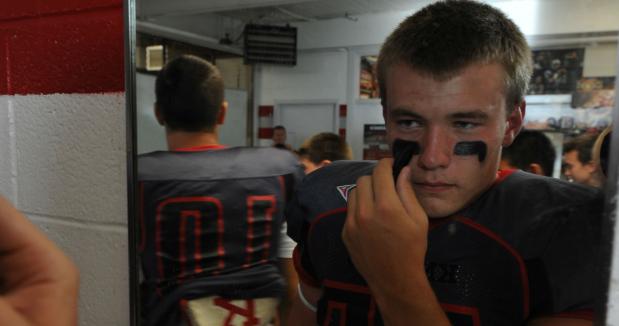Overcome negative self-talk before letting it become prophecy

Have you ever heard yourself or a teammate say something along the lines of:
- That guy is just too big, I can’t handle him.
- I’m not cut out to play that position.
- That team is so much better than us.
- I’m not good enough to start.
- I can’t do this.
- The coach doesn’t like me.
These are all examples of what is called negative self-talk
Negative self-talk is one of the biggest issues for football players as a source of interference that holds them back from playing their best. Its destructive capabilities are underestimated by athletes and coaches because most the negative self-talk that poisons the mind is not spoken aloud. They are just thoughts or voices in the player’s head. Rest assured, internal negative self-talk is just as hurtful, maybe even worse, since there is nobody to hear it to help the athlete out with it.
Football is a sport with a lot of time between plays and even more time for those on the bench waiting to get in. All that time gives players’ minds an opportunity to go negative, which then creates worry about making mistakes, which makes players play timidly and tentatively – not good for football.
Players have more mind power than they need to play football. This is actually true of all sports as everyone has a huge capacity to process information. So, in order to eliminate negative, destructive thinking, keep that intelligent mind of yours busy with other things to think about so that it crowds out the negative thoughts.
This means:
- Constantly going over the details of the fundamentals of your position.
- Watching and studying opponents for their weaknesses and patterns
- Observing teammates and asking yourself what is the best thing I can do right now to pump them up or help them out.
Sometimes, coaches are fond of telling a player: “Get your head in the game.” That really means: ”Focus on what you’re doing,” and that is good advice when you find your mind wandering on the field. But if you aren’t actually in the game and you find yourself thinking negatively, it’s much better to think of things outside of the game that at least occupy your mind so negative thoughts don’t have a chance to take over and create fear.
The first step to eliminating negative self-talk is to become aware of when you do it. Catch yourself in the act, then correct it with the opposite of the negativity. For example:
Instead of: “Oh no, this guy keeps beating me off the line,” try instead: “This is a new game for me right now, I own this guy.”
I recommend to my athletes to wear a rubber band around their wrists, and when they hear themselves thinking or saying something negative, they are to snap the rubber band and then say their opposite statement out loud.
This works like magic to clean up the negative self-talk. I got the idea watching film of former NFL quarterback Brett Favre, who wore rubber bands on his wrist as mental reminders.
On top of that, teammates need to have an open agreement that players and coaches can call each other out whenever they hear this negative self-talk. This kind of accountability breeds an atmosphere of positivity that significantly boosts everyone’s confidence, and ultimately their performance on the field.
Do it!
Craig Sigl’s work with youth athletes has been featured on NBC TV and ESPN. Get his free ebook: “The 10 Commandments For a Great Sports Parent” and also a free training and .mp3 guided visualization to help young athletes perform under pressure by visiting: http://www.MentalToughnessTrainer.com.
